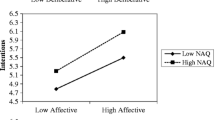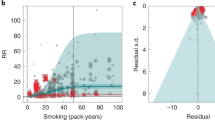Abstract
In response to disagreements about the extent to which smokers recognize the full risk of smoking-induced illness, an attempt was made to review all articles that have investigated smokers' risk perceptions. These diverse studies are grouped here into four categories, depending on the type of risk judgment solicited by researchers. This grouping shows that the apparent underestimation or overestimation of risk depends on how risk perceptions are assessed. No single conclusion about the accuracy of smokers' numerical risk estimates is possible since the accuracy depends entirely on the health outcome rated (e.g. lung cancer versus all deaths due to smoking). With other types of risk questions, smokers consistently acknowledge that smoking increases health risks, but they judge the size of these increases to be smaller and less well-established than do non-smokers. Finally, smokers minimize the personal relevance of the risks; they do not believe that they are as much at risk as other smokers of becoming addicted or suffering health effects. The accumulated data indicate that smokers continue to minimize their personal health risks.
Similar content being viewed by others
References
Kristiansen CM, Harding CM, Eiser JR: Beliefs about the relationship between smoking and causes of death.Basic and Applied Social Psychology. 1983,4:253–261.
Sutton SR: Are smokers unrealistically optimistic about the health risks? Unpublished Manuscript (under editorial review), Department of Epidemiology and Public Health, University College, London, 1995.
Viscusi WK: Do smokers underestimate risks?Journal of Political Economy. 1990,98:1253–1269.
Viscusi WK:Smoking: Making the Risky Decision. New York: Oxford University Press, 1992.
Schoenbrun M: Do smokers understand the mortality effects of smoking? Evidence from the Health and Retirement Survey.American Journal of Public Health. 1997,87:755–759.
Sutton SR: How ordinary people in Great Britain perceive the health risks of smoking.Journal of Epidemiology and Community Health. 1998,52:338–339.
Borland R: What do people's estimates of smoking-related risk mean?Psychology and Health. 1997,12:513–521.
Shiloh S, Saxe L: Perception of risk in genetic counseling.Psychology and Health. 1989,3:45–61.
Windschitl PD, Wells GL: Measuring psychological uncertainty: Verbal versus numeric methods.Journal of Experimental Social Psychology: Applied. 1996,2:343–364.
Black WC, Nease Jr. RF, Tosteson ANA: Perceptions of breast cancer risk and screening effectiveness in women younger than 50 years of age.Journal of the National Cancer Institute. 1995,87:720–731.
Diefenbach M, Weinstein ND: Scales for assessing perceptions of personal risk susceptibility.Health Education Research. 1993,8:181–192.
Lippman-Hand A, Fraser FC: Genetic counseling: Provision and reception of information.American Journal of Medical Genetics. 1979,3:113–117.
Slovic P: Perception of risk.Science. 1987,236:280–285.
Sandman PM, Weinstein ND: How location on a “risk ladder” affects perceived risk.Risk Analysis. 1994,14:35–45.
Weinstein ND: Unrealistic optimism about susceptibility to health problems: Conclusions from a community-wide sample.Journal of Behavioral Medicine. 1987,10:481–500.
Weinstein ND: References on perceived invulnerability and optimistic biases about risk or future life events. Unpublished bibliography, Department of Human Ecology, Rutgers University, New Brunswick, NJ: 1998.
Gibbons FX, Buunk BP:Health, Coping, and Social Comparison. Hillsdale, NJ: Erlbaum, 1997.
Boney-McCoy S, Gibbons FX, Reis TJ, et al: Perceptions of smoking risk as a function of smoking status.Journal of Behavioral Medicine, 1992,15:469–488.
Chapman S, Wong WL, Smith W: Self-exempting beliefs about smoking and health: Differences between smokers and ex-smokers.American Journal of Public Health. 1993,83:215–219.
Cohn LD, Macfarlane S, Yanez C, Imai WK: Risk-perception: Differences between adolescents and adultsHealth Psychology. 1995,14:217–222.
Gerrard M, Gibbons FX, Benthin AC, Hessling RM: A longitudinal study of the reciprocal nature of risk behaviors and cognitions in adolescents: What you do shapes what you think, and vice versa.Health Psychology. 1996,15:344–354.
Hahn A, Renner B, Schwarzer R: Perception of health risk: How smoker status affects defensive optimismSnxiety, Stress and Coping: An International Journal. 1998,11:93–112.
Hansen WB, Malotte CK: Perceived personal immunity: The development of beliefs about susceptibility to the consequences of smoking.Preventive Medicine. 1986,15:363–372.
Lee C: Perceptions of immunity to disease in adult smokers.Journal of Behavioral Medicine. 1989,12:267–277.
McKenna FP, Warburton DM, Winwood M: Exploring the limits of optimism: The case of smokers' decision-making.British Journal of Psychology. 1993,84:389–394.
Reppuci JD, Revenson TA, Aber M: Unrealistic optimism among adolescent smokers and non-smokers.The Journal of Primary Prevention. 1991,11:227–236.
Strecher VJ, Kreuter MW, Kobrin SC: Do cigarette smokers have unrealistic perceptions of their heart attack, cancer, and stroke risks?Journal of Behavioral Medicine. 1995,18:45–54.
Benthin A, Slovic P, Severson H: A psychometric study of adolescent risk perception.Journal of Adolescence. 1993,16:153–168.
Boyle CM: Some factors affecting the smoking habits of a group of teenagers.Lancet. 1968,2(7581):1287–1289.
Eiser JR, Sutton SR, Wober M: Smoking, seat-belts, and beliefs about health.Addictive Behaviors. 1979,4:331–338.
Greening L, Dollinger SJ: Adolescent smoking and perceived vulnerability to smoking-related causes of death.Journal of Pediatric Psychology. 1991,16:687–699.
LoConte JS: Optimistic risk perceptions and external risk attributions among smokers: Identifying dimensions of risk-minimization and their correlates. Unpublished doctoral dissertation. Department of Psychology, Rutgers University, New Brunswick, NJ, 1995.
Slovic P: What does it mean to know a risk? Adolescents' perceptions of short-term and long-term consequences of smoking.Journal of Behavioral Decision Making (in press, 1998).
Viscusi WK: Age variations in risk perceptions and smoking decisions.The Review of Economics and Statistics. 1991,73:577–588.
Leventhal H, Glynn K, Fleming R: Is the smoking decision an “informed choice”?Journal of the American Medical Association. 1987,257:3373–3376.
Sutton SR: Unrealistic optimism in smokers: Effect of receiving information about the average smoker. Unpublished Manuscript (under editorial review), Department of Epidemiology and Public Health, University College, London, 1995.
Segerstrom SC, McCarthy WJ, Caskey NH: Optimistic bias among cigarette smokers.Journal of Applied Social Psychology. 1993,23:1606–1618.
Gibbons FX, McGovern PG, Lando HA: Relapse and risk perception among members of a smoking cessation clinic.Health Psychology. 1991,10:42–45.
McCaul KD, O'Donnell SM: Naive beliefs about breast cancer risk. Unpublished manuscript (under editorial review), Department of Psychology, North Dakota State University, 1997.
Hoorens V: Unrealistic optimism in social comparison of health and safety risks. In Rutter LD and Quine L (eds),The Social Psychology of Health and Safety: European Perspectives Aldershot, Great Britain: Avebury/Ashgate, 1996, 153–174.
Schwarzer R: Optimism, vulnerability, and self-beliefs as health-related cognitions: A systematic review.Psychology and Health. 1994,9:161–180.
Weinstein ND, Klein WM: Resistance of personal risk perceptions to debiasing interventions.Health Psychology. 1995,14:132–140.
Flay BR: Psychological approaches to smoking prevention: A review of findings.Health Psychology. 1985,4:449–488.
Author information
Authors and Affiliations
Additional information
This article is based on a paper prepared for The Robert Wood Johnson Foundation Conference New Partnerships and Paradigms for Tobacco Prevention Research, Sundance, Utah, May, 1997.
Suggestions made by anonymous reviewers are gratefully acknowledged.
About this article
Cite this article
Weinstein, N.D. Accuracy of smokers' risk perceptions. ann. behav. med. 20, 135–140 (1998). https://doi.org/10.1007/BF02884459
Issue Date:
DOI: https://doi.org/10.1007/BF02884459




